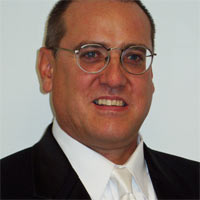Master Chorale Performs Theodorakis’s Canto General
Choral Work Based on Epic Poem by Pablo Neruda
Great art involves sacrifice, but few artists have given their lives and freedom for principle the way Mikis Theodorakis and Pablo Neruda did for the magnificent work to be performed by the Santa Barbara Master Chorale next week. Theodorakis, a composer and hero of the resistance to the Greek military dictatorship of 1967-1974, and Pablo Neruda, a poet and politician exiled from Chile, devoted significant parts of their careers creating this powerful statement of freedom.

Steven Hodson, the S.B. Master Chorale’s conductor, explained his decision to perform the work this season: “An important part of the Master Chorale’s mission is to reach out to the Hispanic community, and performing an important work in Spanish is a great way to do that. The poetry itself is breathtaking—it glistens on the page with beauty and some anger. It shows so much love for the Americas: its people, its animals, and its plant life. It’s not always gentle—it’s a protest against colonial governments and bloodshed, and it shows us the feeling of liberation, and it’s all mixed with beautiful poetry about flora and fauna. It’s truly a song of the people, and very close to the heart of a person growing up.”
Hodson also made the case for the magnificence and popular appeal of the music, apart from its extraordinary libretto: “The composer outdid himself rhythmically—it has a complicated asymmetricality. The chorale has performed this work several times in the past, and the community came out and appreciated it.”
Hodson and the S.B. Master Chorale have a remarkable range of offerings coming this year, including the music of Broadway later this spring and Mozart’s Requiem in the fall. “We’re doing quite well, [we’re] quite alive,” explains Hodson. “We’ve got a mix of new younger singers and veterans for the group, giving us a wonderful mix of ages, and there’s lots of enthusiasm for this music.” The Master Chorale prides itself on performing excellent music with a professional conductor, orchestra, and soloists, along with its chorale community volunteers, and has been doing so for 25 years. Hodson, a professor of music at Westmont College, is well-known conductor of classical, jazz, and world music.
But for him and many others, this coming concert has special meaning. “I’m struck by the parallels between Neruda’s and the composer’s life—both had to go into exile; both were important protest figures; both had an extraordinary love of nature and the people. Although we’re fortunate here in Santa Barbara not to be living under a dictatorship, as Neruda and Theodorakis were when they created the work, but we can recognize the particular challenges of Latin America in it.”
The history of the work reveals a lot about its significance. Its first performance was supposed to happen in a stadium in Santiago, Chile, in September 1973, but President Salvador Allende, a friend and ally to Neruda, was overthrown and assassinated. General Augusto Pinochet, who led the coup, used the stadium to imprison and torture political opponents instead. When the work finally premiered two years later in Greece, Theodorakis added a Requiem in honor of Neruda, who had died of cancer. Theodorakis did not perform the piece in Chile until 1993—at Neruda’s tomb.
4•1•1
The Santa Barbara Master Chorale presents Canto General by Pablo Neruda and Mikis Theodorakis, Saturday, March 13, at 8 p.m., and Sunday, March 14, at 3 p.m., at the First Presbyterian Church, 21 East Constance Avenue. For more information, call 967-8287.



